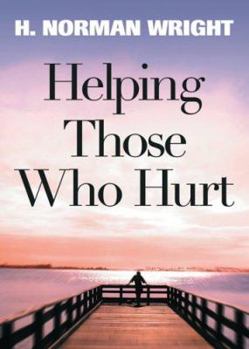Helping Those Who Hurt
Select Format
Select Condition 
Book Overview
Proven, compassionate ways to comfort the wounded with practical tips on how to say the right things to friends and loved ones. This description may be from another edition of this product.
Format:Paperback
Language:English
ISBN:0764203061
ISBN13:9780764203060
Release Date:December 2006
Publisher:Bethany House Publishers
Length:143 Pages
Weight:0.30 lbs.
Dimensions:0.4" x 5.0" x 7.0"
Customer Reviews
3 ratings
Helping those who hurt is manageable
Published by Thriftbooks.com User , 14 years ago
This is a wonderful starter book for learning to help friends and people in need.
A great resource for anyone who wants to make a difference in the lives of those around them.
Published by Thriftbooks.com User , 17 years ago
Have you ever had something difficult happen to a friend and struggled with what to say? If so, then Helping Those Who Hurt by H. Norman Wright is a must read! This practical, insightful resource walks readers through ways they can be an encouragement and a help to someone who has experienced a devastating loss. Whether a friend is going through a divorce, lost a spouse, has been diagnosed with a deadly disease, or experienced heartache or trauma, the question is not whether or not to help but rather how and when to get involved and show that you care. As a licensed therapist and certified trauma specialist, Wright shares his own story of losing his son at a young age. Thus, his perspective is personal and his advice highly practical. He writes: "Helping others includes experiencing genuine interest and love for the individual. We can listen and rely upon the power of God for knowing how to respond, but we must also have a genuine interest and love. If it's not there, you can't fake it, and your friend will know if you are. It's so easy to rattle off an answer that's superficial and doesn't meet you friend's need... To help someone else, you need to know when to speak and when enough has been said." Wright goes inside the mind of both the person who wants to help and the person who has experienced the loss. He explains the struggles of each party. The one who wants to help may be confronted by someone who is suffering from PTSD (Post-Traumatic Stress Disorder) or experiencing the different stages of grieving. Handling the various emotional responses can be challenging and exhausting. At the same time, the one who has experienced the loss may be disoriented, disengaged or trying to distance themselves from those they need. Understanding the responses can go a long way to strengthening the relationship in the long term. He writes: "What can you expect from a friend who is hurting? Actually, not very much. And the more her experience moves beyond a loss and closer to a crisis or trauma, the more this is true. Sometimes you'll see a friend experiencing a case of the `crazies.' Her response seems irrational. She's not herself. Her behavior is different from or even abnormal compared to the person not going through a major loss. Just remember, she's reacting to an out-of-the-ordinary event. What she experienced is abnormal, so her response is actually quite normal." One of the best sections of the book offers a list of words better left unsaid. It highlights topics and comments that should be taboo. Comments like "Time will heal" and "God needs him/her more than you do" often do more harm than good. In addition, friends should avoid any clichés that discount a person's feelings, such as "I know just how you feel" and "If there is anything I can do, just call me." Instead, those who want to help should be willing to listen and offer specific services, whether it's making a meal, cleaning around the house or helping with errands. Helping Those Who
Good advice
Published by Thriftbooks.com User , 20 years ago
H. Wright has had experiences of losses himself so he does no what the person who lost something is thinking. The book is mainly for people who have lost a loved one, but it talks in general statements that include other issues like losing a job. He talks about what the person is going through, what they are thinking, how they will react, and how to handle. He talks about how you can help that hurting person, but usually there's not a lot to do, so he talks a lot about what you shouldn't do or say that might hurt the person more. This is a good book if you really care about someone who just lost a loved one and you want to do the right thing. He also puts each specific topic in each chapter so you can just go to the chapter that you need instruction on and that will help the person, so you don't have to read the whole book before you know what to do (because obviously the needs you right now). And even though this was written by a Christian and it has Christian perspectives, it is just as effective for a secular person, because the only advantage of the person that died is that if he is a Christian then he is going to Heaven, but H. Wright says that most statements about that assurance doesn't help, so it will help the secular person the same it will a Christian.





